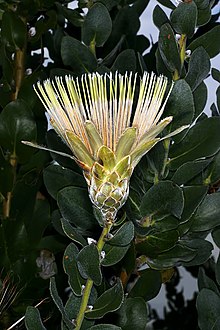
Protea aurea, the long-bud sugarbush, is a shrub or small tree with a single trunk occurring in mountain fynbos, usually on cool, moist, southern slopes. It is endemic to the Cape Provinces of South Africa.

Protea welwitschii is a species of shrub or small tree which belongs to the genus Protea, and which occurs in bushveld and different types of grassland.

Protea laurifolia, also known as the grey-leaf sugarbush, is a shrub from South Africa. It is native to the Cape Provinces of South Africa.
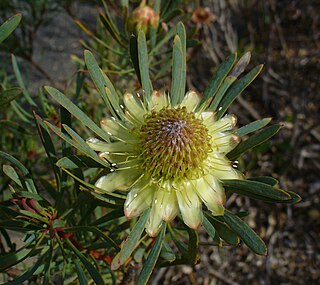
Protea scolymocephala, also known as the thistle protea or thistle sugarbush, is a flowering plant from the genus Protea native to South Africa.

Protea acaulos, also known as the common ground sugarbush, is a flowering plant found in the southwestern Cape Region, South Africa. It is also simply known as ground protea; in the Afrikaans language it is known as an aardroos.

Vexatorella obtusata is an evergreen shrub, with narrow, leathery leaves and about 2 cm big, globular flowerheads consisting of well scented, creamy pink flowers, from which a long style with a thickened tip extends. Two subspecies are distinguished, both restricted to different parts of the Western Cape province of South Africa. The creeping V. obtusata subsp. obtusata, also known as the Montagu vexator flowers from September to December, and the upright V. obtusata subsp. albomontana, also known as the Witteberg vexator, that has flowers between August and November.

Protea namaquana, also known as the Kamiesberg sugarbush, is a flowering plant which belongs to the genus Protea. The plant is endemic to the southwestern Cape Region of South Africa, in particular the Kamiesberg mountains of Namaqualand in the Northern Cape province. The species has a worldwide distribution of only 18 km2. It is regarded as critically endangered. In the Afrikaans language it has the vernacular name is Kamiesbergsuikerbos.

Protea pendula, also known as the nodding sugarbush or arid sugarbush, is a flowering plant of the genus Protea, in the family Proteaceae, which is only found growing in the wild in the Cape Region of South Africa. In the Afrikaans language it is known as knikkopsuikerbossie or ondersteboknopprotea.

Protea tenax also known as the tenacious sugarbush , is a flowering plant of the family Proteaceae endemic to South Africa and distributed in the Outeniqua, Tsitsikamma, Kouga and Winterhoek mountains as well as the Baviaanskloof. In Afrikaans it is known as Gehardesuikerbos.
Protea vogtsiae, also known as the Kouga sugarbush, is a small flowering shrub of the genus Protea within the family Proteaceae, which is only found growing in the wild in the southern Cape Region of South Africa.
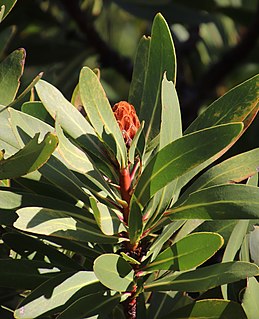
Protea rubropilosa, also known as the Transvaal sugarbush, escarpment sugarbush or Transvaal mountain sugarbush, is a flowering tree, that belongs to the genus Protea in the family Proteaceae. The plant only occurs in South Africa.
Protea dracomontana, the Nyanga protea or the Drakensberg sugarbush, is a flowering plant that belongs within the genus Protea. The plant is found in the Eastern Cape, Lesotho, KwaZulu-Natal and the escarpment of the Free State, as well as eastern Zimbabwe. In Zimbabwe this species is only known from a disjunct subpopulation confined to the summit of Mount Nyangani.
Protea pudens, also known as the bashful sugarbush, is a low-growing, groundcover-like, flowering shrub in the genus Protea. It is only found growing in the wild in a small area in the Western Cape province of South Africa.

Protea stokoei is a flowering shrub which belongs to the genus Protea. The plant is endemic to South Africa. It is found in the Kogelberg and Greenland mountains around Elgin.
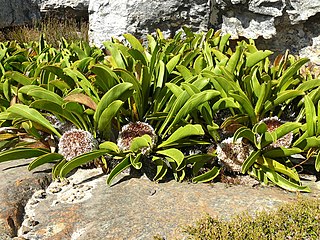
Protea cryophila, the snowball sugarbush, snow protea, or snowball protea, is a flowering shrub of the genus Protea. The plant is endemic to the Cederberg.
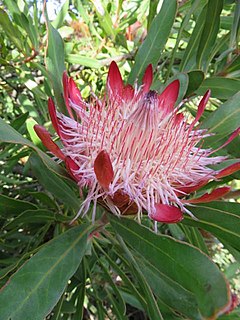
Protea susannae, also known as stink-leaf sugarbush, is a flower-bearing shrub of the genus Protea. The plant is endemic to the southwestern Cape Region of South Africa.
Protea lacticolor or the Hottentot sugarbush, Hottentot white sugarbush or Hottentot’s Holland sugarbush, is a flowering shrub of the Protea genus. It is also known as the Hottentotwitsukkerbos. The plant is endemic to South Africa and is found from the Slanghoek to the Hottentots Holland Mountains and also the Groenlandberg.
Protea nubigena, commonly known as cloud sugarbush, is a very rare species of a flowering shrub belonging to the Protea genus. It is endemic to KwaZulu-Natal, South Africa and is found in the uKhahlamba Basalt Grassland within the Royal Natal National Park, near Mont-Aux-Sources, at an altitude of about 2,250 metres (7,380 ft) in well-drained, humus-rich soil on shaded slopes.
Protea convexa, also known as large-leaf sugarbush, is a rare flowering shrub in the genus Protea of the family Proteaceae, which is endemic to the southwestern Cape Region of South Africa.
Protea decurrens, also known as linear-leaf sugarbush, is a shrub of the genus Protea, in the Proteaceae family, which is endemic to the southwestern Cape Region of South Africa. It is a small shrub with a thick underground rootstock, this structure throwing up numerous leafy branches, upon the base of which clusters of flower heads may appear close to the ground. It is pollinated by rodents and grows in low-altitude fynbos or renosterveld.
